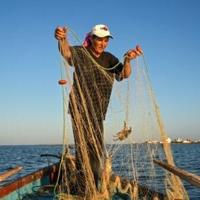Prepared her small fishing boat off a serene Tunisian island, Sara Souissi defies societal norms in her male-dominated trade. She navigates not only through entrenched patriarchy but also environmental challenges threatening her livelihood.
Becoming a fisherwoman as a teenager in a family of fishers from the Kerkennah Islands near Sfax, Souissi defied the traditional belief that women have no place at sea.
“Our society did not embrace the idea of a woman fishing,” she remarked while hauling a catch onto her turquoise boat.
“Despite the resistance, I persisted because of my passion for fishing and the sea,” stated Souissi, a 43-year-old mother married to a fisherman.
With a significant coastal presence in Tunisia, the sea plays a vital role in daily life. Seafood, essential to Tunisian cuisine, is also a major export commodity, with Italy, Spain, and Malta being top buyers, generating nearly $295 million in revenue last year, according to official reports.
Tunisian women have historically been important contributors to this critical industry. However, a recent study by the United Nations Food and Agriculture Organization (FAO) highlighted the undervaluation and lack of support for their work.
Although women are actively involved in various aspects of the fishing industry, their male counterparts often do not recognize them as legitimate workers. Fisherwomen face challenges in accessing administrative benefits, training, and financial services, where they are perceived as higher risk borrowers compared to men.
Resulting from these barriers, many women do not own their own boats and are often not compensated when working with male relatives, as they are considered family help rather than employees.
– Seeking Integration –
In Raoued, a coastal town near Tunis, the Tunisian Society for Sustainable Fishing conducted a workshop in June to promote women’s participation in the industry. However, most women attending the training expressed that they were there to assist male relatives.
One participant, Safa Ben Khalifa, highlighted the potential for women in the field: “Women can contribute to making fish nets.” Despite no official figures on fisherwomen in Tunisia, many, like Souissi, work informally due to various challenges.
“Amidst climate change, declining marine resources, and unsustainable fishing practices, we aim to develop additional resources,” explained Ryma Moussaoui, the workshop coordinator in Raoued.
Last month, the Mediterranean Sea recorded its highest temperature on record, reaching 28.9 degrees Celsius, exacerbating the strain on marine life caused by pollution and overfishing.
Souissi criticized fishers utilizing unsustainable methods, such as trawling and plastic traps, for disregarding regulations and catching marine life indiscriminately, even during off-seasons.
– Environmental Challenges –
In Skhira in 2017, 40 women clam collectors formed an association to improve their income, bypassing exploitative middlemen. However, their gains were eroded by pollution, leading to a ban on clam collecting in 2020 due to declining shellfish populations.
Industrial waste discharge into the Gulf of Gabes has adversely affected clam health and driven other species away, impacting fishers’ revenue. This environmental degradation has prompted some to sell their boats to illegal migrants crossing the Mediterranean.
To navigate these challenges, Souissi emphasized the importance of fishing responsibly. She advocates for sustainable practices in order to protect marine life and ensure survival in the face of environmental threats.
“If not fishing, then what?” pondered Souissi as she guided her boat back to shore. “Staying at home and cleaning? No, I want to continue fishing.”
bou/it/smw





